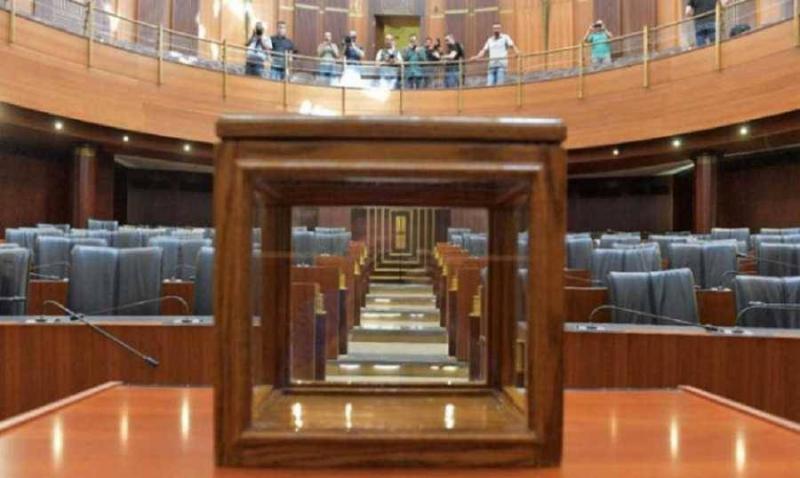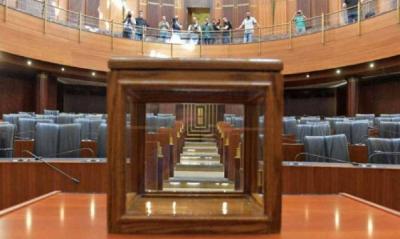As the celebratory circles of the "change-makers" in the parliamentary elections began to dissolve, reality quickly set in: Berri and Bou Saab, representing "Amal" and the "Free Patriotic Movement," which symbolizes the current authority in its dual branches—its ally, "Hezbollah," on the right, and its partner to the left. What is the secret behind the historical defeats that befall the opponents of "the party," with no end in sight?
Following the recent elections for the President of the Parliament, and particularly for his Deputy, it can be said that the forces carrying the "change" slogan are witnessing their third defeat since the Syrian withdrawal from Lebanon in 2005:
1. The defeat of March 14, inflicted by intimidation that cost the "change-makers" dearly, but also by enticing offers that undermined the idea of change. This enticement justified the use of intimidation. Consequently, attempts to alter the pre-2005 status quo fell short, with Damascus withdrawing its army to hand over Lebanon to its allies. It became evident that the March 14 group was not up to the level of the change project, neither in strategic depth nor in the purity and integrity of the change-oriented thought, thereby easing the task for their opponents.
2. The defeat of the "civil forces" uprising from 2017 to 2018, where attempts to revive the street over two years collapsed. The hope of this movement was to achieve a democratic "invasion" of parliamentary seats during the 2018 elections, but this group failed to unify its ranks across all electoral districts in Lebanon. The ruling forces had prepared for this by inventing an electoral law that significantly complicated the entry of new forces.
3. The defeat of the October 17, 2019 "revolution." The scenario of intimidation and enticement, along with fragmentation, repeated itself, despite the fact that the "revolution" had reached very advanced levels and received strong international and Arab support. The formation of Hassan Diab's government led to a "deflation" of this movement. The port explosion, with its judicial ramifications, was expected to provide the change agenda with new momentum, but this did not materialize. The hope was a unified list for the change forces to contest the 2022 elections.
These forces failed in the elections, although they managed a partial success, and they bear responsibility for this due to two main reasons:
First, they did not exhibit solidarity in seeking to win the majority. The parliamentary structure is not proportional, but rather based on majority and minority. It is not feasible to rely on 30, 40, or 50 MPs advocating for change from a total of 128, because decisions will remain in the hands of others, as was evident in the election of the Parliament's president and his deputy. The change forces could have swept more than 64 seats had they pursued a united battle in all districts, but they did not do so.
Second, the forces advocating for "change" rejected genuine collaboration, largely exhibiting selfishness and individualism. Since "Hezbollah" and its allies in power were united around a political goal, their opponents—regardless of the labels they carry (opposition, dissent, change, "revolution," civil society)—should have united under a political banner as well. Fighting should be done with the same weapon, not a different one. However, this also did not happen.
The elections for the Parliament’s presidency and vice-presidency soon revealed the underlying weaknesses within the ranks that categorize themselves as opposition, dissent, "change," and "independent." This confusion in classification allowed the cohesive team, although not a majority, to win its first battles shortly after the elections.
This analysis does not negate a fundamental truth: that President Nabih Berri was the only option for the presidency of the council, as all 27 Shiite MPs belong to a single political team. If there were one or two or five Shiite MPs outside this political team in the new council, it would not change anything on the ground, as it wouldn’t be possible to elect any of them as president of the council without violating the "constitutional norms" applicable in the Lebanese sectarian system.
However, the battle for the vice-presidency is more expressive, where internal swaps and interlinked interests could be discussed. For the record, the vice-presidency resembles a bank "check" that cannot be cashed, or at best, resembles a check in "currency" that may not equal 20% of its nominal value and can be voided at any moment! Thus, the Shiite team would laugh heartily when they secured the presidency of the council and began to "play" with the vice-presidency.
What is noteworthy is what some circles are circulating about external implications that encouraged the agreement in the elections for the presidency and vice-presidency of the council, specifically contributing to securing the quorum for electing Bou Saab through "pressuring" some forces categorized as "change," knowing that his rival Ghassan Skaf practically represents the desired change spirit. This behavior is incomprehensible, and it is one of the wonders of political practice in Lebanon that cannot be understood.
In any case, amid this fragmentation and irresponsibility characteristic of the behavior of the former March 14 forces, the former civil movement, and the former October 17 "revolution," one wonders: in which generation will the "change-makers" learn how to win the battle?




